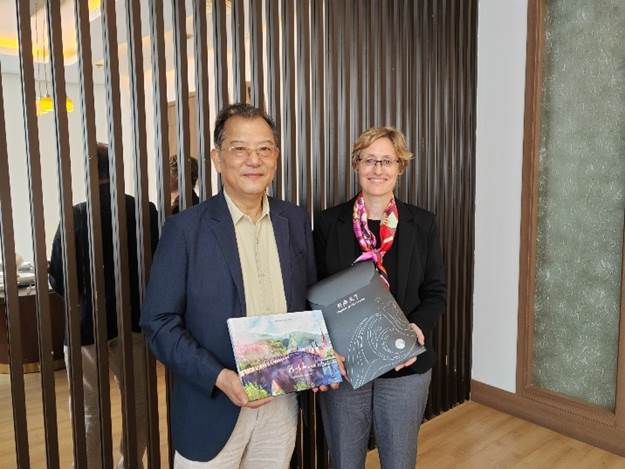On August 4th, Vice President LEI Xinghui met with Anja-Désirée Senz, Vice President of Heidelberg University in Germany at Siping Campus, Tongji University. Present at the meeting were people from the Sino-German College and the International Office of Tongji University.

Vice President LEI Xinghui meeting Anya Sentz, Vice President of Heidelberg University in Germany
LEI introduced the history and development of Tongji University. He said that cooperation with Germany has always been the most important part of Tongji University's internationalization. Since the founding of Tongji University 116 years ago, especially since the establishment of diplomatic relations between China and Germany 50 years ago, Tongji University has built a solid "bridge" for Sino-German cooperation in science, education, and humanities. In order to establish a new model of Sino-German cooperation with better quality, more efficiency, and more in line with the common interests of both countries, Tongji University issued the "Sino-German Cooperation Strategy 2.0 " last year, which will deepen and expand cooperation with German partner universities along three lines of Cultivation of Excellent Engineers, High-level International Cooperation Education with Integration of Science and Education, and Humanities Exchange and Think Tank Group.
Sentz said that Heidelberg University has also implemented a number of major development measures in recent years. First, the "Heidelberg-Mannheim Health and Life Sciences Alliance" was established, and well-known life sciences and medical research institutions in the Rhine-Necka region were invited to join, so as to promote local development in innovative research, patient care, and health economy. Second, the university has newly established an engineering college, whose teaching and research focus on molecular life sciences, biophysics and biochemistry, scientific computing, and machine learning. Through the interaction of new technologies and new hardware concepts, the college has produced new engineering methods, which in turn promote the transformation from natural science to medicine and medical technology and the transfer to industrial applications.
The two sides exchanged and discussed issues such as strengthening cooperation in the fields of medicine, law, economics, and political science in the future and developing cross-research between humanities and social sciences and engineering.